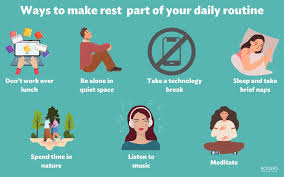Why Sleep Matters Sleep is not just a passive state of rest—it is a vital biological process that impacts nearly every aspect of mental and physical health. From improving cognitive function to boosting immune resilience, getting enough high-quality sleep is essential for overall well-being. Despite its importance, millions of people worldwide struggle with sleep issues, often unaware of the profound effects this can have on their health.
In this article, we will explore the critical role of sleep in maintaining mental and physical health, delve into the science of sleep, and provide actionable tips to help you improve your sleep quality.
What Happens When You Sleep?
The Stages of Sleep
Sleep occurs in cycles, with each cycle lasting approximately 90 minutes. These cycles are divided into four stages:
- Non-REM Stage 1: The transition from wakefulness to sleep, lasting only a few minutes.
- Non-REM Stage 2: A deeper state of relaxation where body temperature drops, and heart rate slows.
- Non-REM Stage 3: Also known as deep sleep, this stage is crucial for physical restoration and immune system support.
- REM (Rapid Eye Movement) Sleep: The dreaming stage, vital for memory consolidation and emotional processing.
The Importance of Sleep Cycles
Each stage of sleep serves a unique purpose, and disrupting these cycles can negatively impact both mental and physical health. Deep sleep promotes cellular repair and growth, while REM sleep strengthens neural connections and emotional resilience.
The Mental Health Benefits of Sleep
Enhancing Cognitive Function
Sleep plays a pivotal role in brain health. During sleep, the brain clears out toxins, including beta-amyloid—a protein linked to Alzheimer’s disease. Additionally, sufficient sleep improves concentration, problem-solving skills, and decision-making abilities.
Regulating Emotions
Lack of sleep can impair the amygdala, the part of the brain responsible for emotional regulation. This can lead to heightened stress responses, irritability, and an increased risk of anxiety and depression.
Supporting Memory and Learning
Sleep is essential for memory consolidation. Studies show that individuals who get adequate sleep are better able to retain and recall information compared to those who are sleep-deprived.
The Physical Health Benefits of Sleep
Strengthening the Immune System
During deep sleep, the body produces cytokines—proteins that help fight infections and inflammation. Chronic sleep deprivation can weaken the immune system, making you more susceptible to illnesses.
Supporting Heart Health
Sleep helps regulate blood pressure and inflammation, both of which are crucial for heart health. Consistently poor sleep has been linked to an increased risk of heart disease, stroke, and hypertension.
Managing Weight and Metabolism
Sleep influences hunger-regulating hormones like leptin and ghrelin. Insufficient sleep can disrupt these hormones, leading to increased appetite and a higher risk of obesity.
The Consequences of Poor Sleep
Mental Health Risks
Chronic sleep deprivation has been linked to mood disorders, including depression and anxiety. It can also exacerbate symptoms in individuals with existing mental health conditions.
Physical Health Risks
Long-term sleep issues are associated with:
- Increased risk of diabetes
- Impaired immune function
- Chronic pain conditions
Reduced Quality of Life
Poor sleep can diminish overall quality of life by affecting energy levels, productivity, and relationships.
Tips for Improving Sleep Quality
Establish a Consistent Sleep Schedule
Go to bed and wake up at the same time every day, even on weekends. This helps regulate your internal body clock.
Create a Relaxing Bedtime Routine
Incorporate calming activities such as reading, meditating, or taking a warm bath to signal to your body that it’s time to wind down.
Optimize Your Sleep Environment
- Keep your bedroom dark, quiet, and cool.
- Invest in a comfortable mattress and pillows.
- Reduce screen time at least an hour before bed to minimize blue light exposure.
Watch Your Diet
Avoid heavy meals, caffeine, and alcohol close to bedtime. Opt for sleep-friendly foods like bananas, almonds, and chamomile tea.
Stay Physically Active
Regular exercise can help regulate sleep patterns, but avoid intense workouts close to bedtime.
Seek Professional Help
If you struggle with chronic sleep issues, consider consulting a healthcare provider or sleep specialist. Conditions like insomnia, sleep apnea, and restless leg syndrome may require medical intervention.
Prioritize Your Sleep
Sleep is a cornerstone of both mental and physical health. By understanding its importance and taking proactive steps to improve sleep quality, you can enhance your overall well-being, reduce health risks, and live a more fulfilling life. Remember, sleep is not a luxury; it is a necessity.
FAQ: Common Questions About Sleep and Health
1. How many hours of sleep do adults need?
Most adults need 7-9 hours of sleep per night, although individual needs may vary.
2. What are the signs of poor sleep quality?
Common signs include difficulty falling asleep, waking up frequently during the night, feeling tired despite adequate sleep duration, and relying on caffeine to stay alert.
3. Can naps make up for lost sleep?
Short naps (20-30 minutes) can boost energy and focus but are not a substitute for regular, restorative nighttime sleep.
4. Is it normal to wake up during the night?
Brief awakenings are normal, but frequent or prolonged awakenings may indicate an underlying sleep disorder.
5. How does stress affect sleep?
Stress can lead to hyperarousal, making it difficult to fall or stay asleep. Practicing relaxation techniques can help mitigate this.
6. What is the best sleep position for health?
Sleeping on your back or side is generally recommended, as these positions support spinal alignment and reduce the risk of pain.
7. Can sleep supplements help?
Melatonin and other sleep aids may be helpful for short-term use but should not replace healthy sleep habits. Always consult a healthcare provider before using supplements.